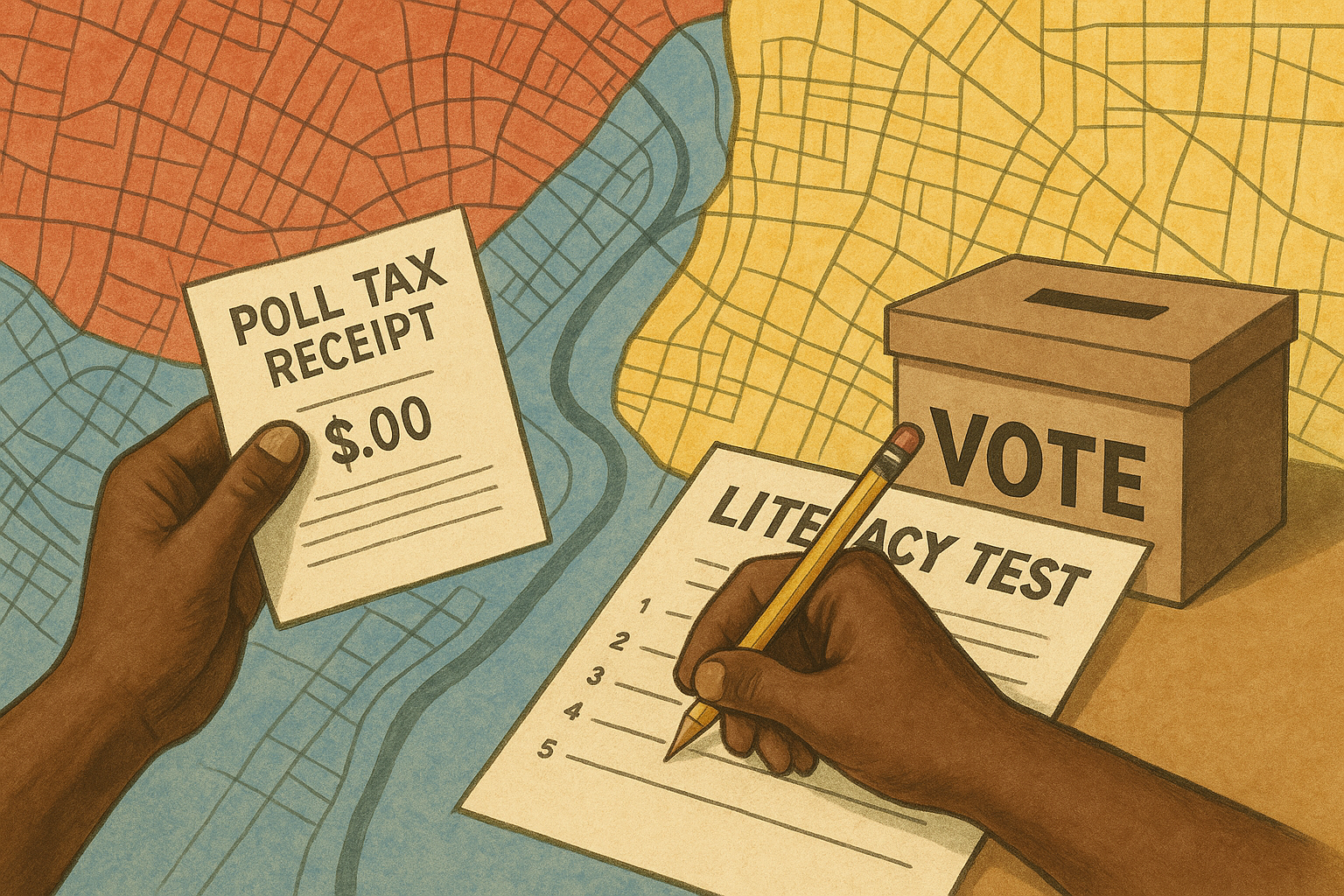After the Civil War, the 15th Amendment declared that no one could be denied the right to vote because of race. On paper, freedom at the ballot box was guaranteed.
But by the late 1800s, states across the South found ways around that promise. They didn’t outlaw Black voting outright — instead, they created barriers like poll taxes and literacy tests that made voting practically impossible for millions of Black citizens and poor whites.
What Were Poll Taxes and Literacy Tests?
- Poll Taxes: Voters were required to pay a fee before casting a ballot. For many poor families — especially freedmen just generations removed from slavery — the tax was unaffordable.
- Literacy Tests: Voters had to prove their ability to read or interpret a passage of the state or U.S. Constitution. In practice, white voters were often passed no matter what, while Black voters faced impossible or arbitrary questions.
- “Grandfather Clauses”: Some states exempted white voters if their grandfather had voted before the Civil War — a loophole designed to ensure Black voters remained excluded.
Together, these laws created a façade of neutrality while targeting exactly who lawmakers wanted out of the voting booth.
How It Worked in Practice
- Suppression by Design: In Mississippi, voter registration for Black men plummeted from 90% in 1867 to less than 6% by 1892.
- Selective Enforcement: Literacy tests could mean anything from reading a line of text to explaining the meaning of obscure constitutional clauses.
- Intimidation: Even when people tried to pay the tax or take the test, they risked harassment, threats, or violence.
The system was designed so that no matter how hard Black citizens tried, they were rarely allowed to succeed.
Why It Still Matters
- Generational Impact: Denial of the ballot meant denial of political power, leaving communities without a say in schools, taxes, and laws.
- Legal Legacy: Poll taxes were outlawed in federal elections in 1964 (24th Amendment) and in state elections in 1966 (Harper v. Virginia Board of Elections). Literacy tests were banned by the Voting Rights Act of 1965.
- Echoes Today: While poll taxes and literacy tests are gone, modern tactics — like strict ID laws or limited polling places — echo the same purpose: raising barriers that disproportionately affect poor and minority voters.
Wider Impacts
- Poor White Voters: Many poor white farmers also struggled to pay poll taxes, showing that these laws weren’t only racial, but also class-based. Still, exemptions and grandfather clauses kept many whites enfranchised while Black voters were systematically excluded.
- Immigrant Voters: Literacy requirements in some states also targeted immigrants whose first language wasn’t English, tying literacy to worthiness.
Stories of Resilience
Despite these barriers, African Americans fought for the vote:
- Grassroots Organizing: Black communities held literacy schools to help each other pass unfair tests.
- Legal Challenges: Civil rights groups continually pressed courts to intervene, laying the groundwork for later victories.
- The Long Fight: Generations carried the struggle forward, from Reconstruction to the civil rights movement of the 1960s.
The resilience to keep registering, marching, and organizing in the face of near-impossible odds is itself a story of courage.
Beyond Blame: Building With Each Other
We didn’t write those laws, but we live with their consequences. Understanding poll taxes and literacy tests helps us see:
- Why voter turnout was so low in the South for decades.
- Why the Voting Rights Act was such a breakthrough.
- Why modern debates about voting access echo struggles more than a century old.
Recognizing these chapters isn’t about shame — it’s about understanding why barriers matter, and how communities have fought to overcome them.
Dig Deeper
Closing Invitation
Poll taxes and literacy tests may seem like relics of another era, but they shaped generations of political silence. They remind us that access to the ballot has never been automatic — it has always been something people had to fight for.
Every Chapter Counts is about lifting up those stories, not to dwell on barriers, but to honor the persistence that overcame them — and to remember that the right to vote remains a right worth protecting.
